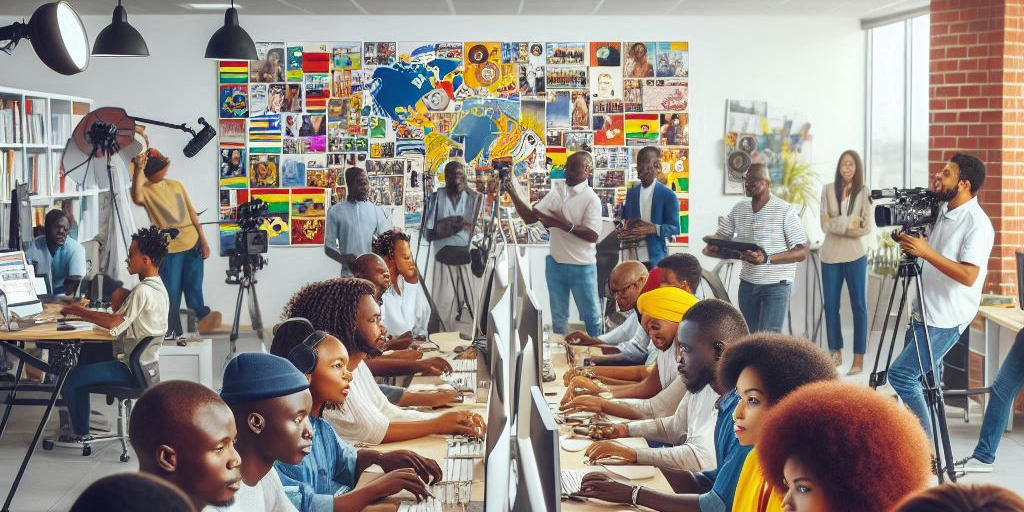Dr. Mahamudu Bawumia’s vision for the media and communication sector emphasizes the protection of media freedom, the advancement of digital media, and the professional development of journalists and media practitioners. Recognizing the importance of media in a democratic society, he aims to enhance opportunities for media professionals by investing in digital platforms and streamlining content creation and streaming policies. This includes supporting online safety, content regulation, and protecting intellectual property to encourage a safe and fair media environment.
Central to his vision is the passage and implementation of the Broadcasting Bill, which is designed to safeguard media freedoms and ensure a balanced regulatory framework for broadcasting. Dr Bawumia seeks to empower journalists through the Media Capacity Enhancement Programme (MCEP), which focuses on equipping them with the skills and knowledge necessary to navigate the evolving media landscape. He also prioritizes journalists’ safety, continuing the Coordinated Mechanism for the Safety of Journalists (CMSJ) to protect them from harm in the line of duty.
Dr. Bawumia’s plan also includes modernizing public media institutions such as the Ghana Broadcasting Corporation (GBC), Ghana News Agency (GNA), and community radio stations to strengthen public access to reliable information. To increase effectiveness, he aims to retool and update the Information Services Department and provide additional resources to the National Media Commission, ensuring these institutions can fulfil their roles more effectively. Furthermore, he is committed to facilitating Right to Information (RTI) requests by reducing costs for media practitioners who may struggle to access public information.
Dr. Bawumia envisions a media sector that is robust, free, and professional, serving as a cornerstone for informed citizenship and accountability in governance. His focus on digital and professional support aims to prepare the media sector to thrive in the digital age while upholding democratic principles and press freedom.
Question 1: How will Bawumia’s administration create opportunities for media professionals through digital platforms?
Answer: The Bawumia administration aims to enhance digital platforms for media professionals by promoting policies that support content creation, streaming, and digital media development. This includes supporting media practitioners with the infrastructure and technological tools they need to reach wider audiences through online platforms. By integrating digital tools, journalists and content creators will be able to monetize their work, secure a larger market, and take advantage of Ghana’s growing digital ecosystem.
Question 2: What measures will be taken to promote online safety, content regulation, and intellectual property protection?
Answer: To safeguard media content and ensure a safe online space, Bawumia’s government will focus on implementing content regulation policies that address issues such as cyberbullying, misinformation, and plagiarism. This will be paired with stronger intellectual property protection laws, ensuring that content creators and media professionals can monetize their creations without fear of exploitation. Additionally, promoting online safety education and collaborating with international bodies to maintain high standards of internet safety will be key priorities.
Question 3: What is the significance of passing the Broadcasting Bill in Bawumia’s media policy?
Answer: The Broadcasting Bill is critical for safeguarding media freedoms in Ghana. It will establish clear regulations and protections for broadcasters, ensuring freedom of speech while preventing media monopolization and content abuse. The Bill will also ensure that broadcasting standards are met, encouraging responsible journalism and promoting a diverse media landscape that serves the public interest.
Question 4: How will the Media Capacity Enhancement Programme (MCEP) benefit journalists?
Answer: The Media Capacity Enhancement Programme (MCEP) will be resourced and expanded to provide training and skills development for journalists. This initiative will help them stay updated on emerging trends in digital journalism, investigative reporting, and ethical standards. The programme will also cover important areas such as data journalism, multimedia content creation, and the use of digital platforms, making journalists more competitive in the global media landscape.
Question 5: What is the Coordinated Mechanism for the Safety of Journalists (CMSJ) and how will it be strengthened?
Answer: The Coordinated Mechanism for the Safety of Journalists (CMSJ) is a framework designed to protect journalists from threats, violence, and intimidation while performing their duties. Under a Bawumia administration, this mechanism will be further strengthened by providing additional resources for journalist safety, enforcing laws against the harassment of media personnel, and fostering collaboration between law enforcement agencies and media watchdog organizations to ensure swift protection and responses to threats.
Question 6: How will Bawumia’s government facilitate Right to Information (RTI) requests for media practitioners?
Answer: To facilitate Right to Information (RTI) requests, Bawumia’s administration will implement policies that subsidize RTI access fees for media practitioners who may not be able to afford them. The government will also streamline the RTI request process, using digital platforms to ensure faster and more efficient responses to information requests, thereby promoting transparency and accountability in governance.


